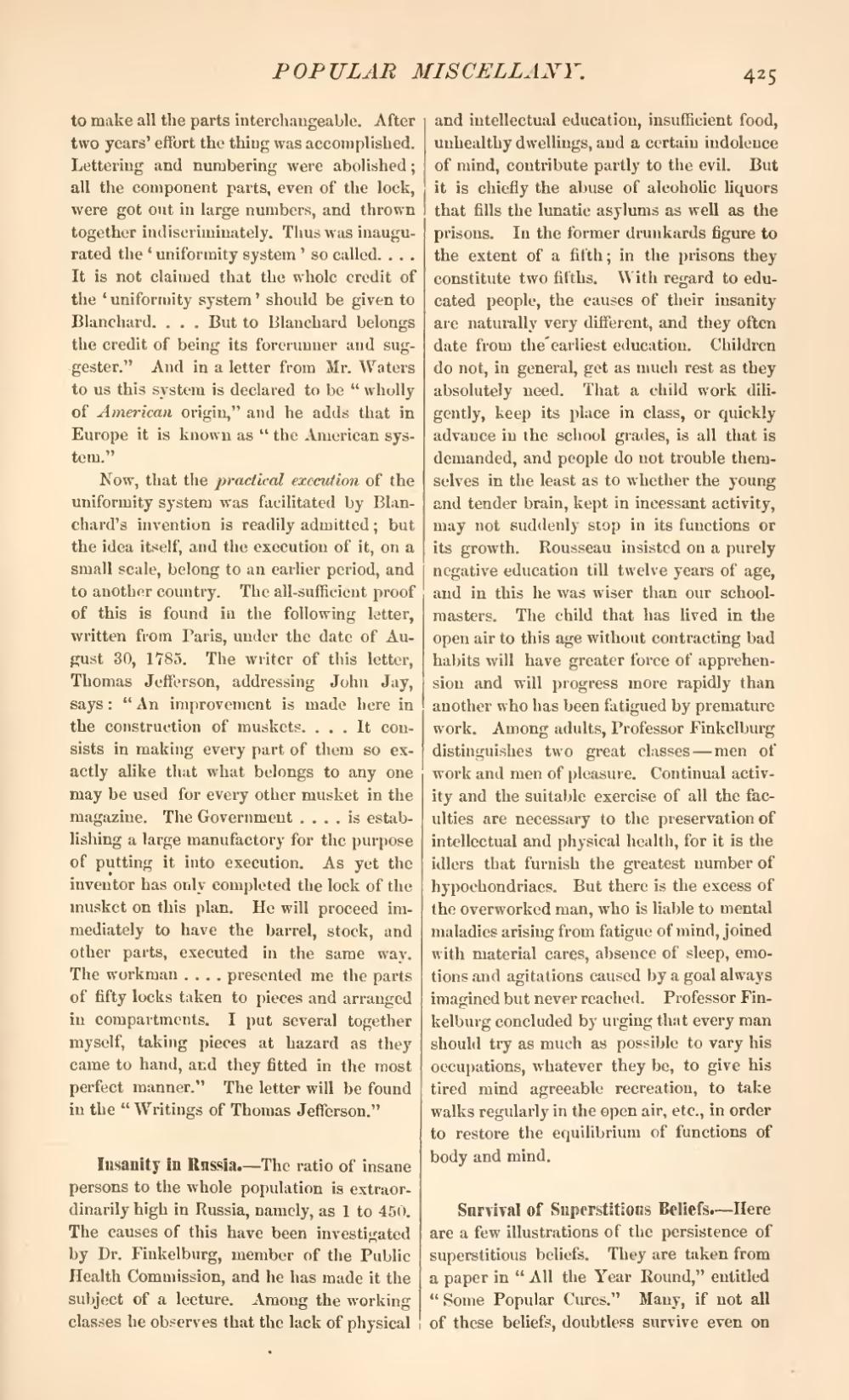to make all the parts interchangeable. After two years' effort the thing was accomplished. Lettering and numbering were abolished; all the component parts, even of the lock, were got out in large numbers, and thrown together indiscriminately. Thus was inaugurated the 'uniformity system' so called. . . . It is not claimed that the whole credit of the 'uniformity system' should be given to Blanchard. . . . But to Blanchard belongs the credit of being its forerunner and suggester." And in a letter from Mr. Waters to us this system is declared to be "wholly of American origin," and he adds that in Europe it is known as "the American system."
Now, that the practical execution of the uniformity system was facilitated by Blanchard's invention is readily admitted; but the idea itself, and the execution of it, on a small scale, belong to an earlier period, and to another country. The all-sufficient proof of this is found in the following letter, written from Paris, under the date of August 30, 1785. The writer of this letter, Thomas Jefferson, addressing John Jay, says: "An improvement is made here in the construction of muskets. . . . It consists in making every part of them so exactly alike that what belongs to any one may be used for every other musket in the magazine. The Government. . . . is establishing a large manufactory for the purpose of putting it into execution. As yet the inventor has only completed the lock of the musket on this plan. He will proceed immediately to have the barrel, stock, and other parts, executed in the same way. The workman. . . . presented me the parts of fifty locks taken to pieces and arranged in compartments. I put several together myself, taking pieces at hazard as they came to hand, and they fitted in the most perfect manner." The letter will be found in the "Writings of Thomas Jefferson."
Insanity in Russia.—The ratio of insane persons to the whole population is extraordinarily high in Russia, namely, as 1 to 450. The causes of this have been investigated by Dr. Finkelburg, member of the Public Health Commission, and he has made it the subject of a lecture. Among the working classes he observes that the lack of physical and intellectual education, insufficient food, unhealthy dwellings, and a certain indolence of mind, contribute partly to the evil. But it is chiefly the abuse of alcoholic liquors that fills the lunatic asylums as well as the prisons. In the former drunkards figure to the extent of a fifth; in the prisons they constitute two fifths. With regard to educated people, the causes of their insanity are naturally very different, and they often date from the' earliest education. Children do not, in general, get as much rest as they absolutely need. That a child work diligently, keep its place in class, or quickly advance in the school grades, is all that is demanded, and people do not trouble themselves in the least as to whether the young and tender brain, kept in incessant activity, may not suddenly stop in its functions or its growth. Rousseau insisted on a purely negative education till twelve years of age, and in this he was wiser than our schoolmasters. The child that has lived in the open air to this age without contracting bad habits will have greater force of apprehension and will progress more rapidly than another who has been fatigued by premature work. Among adults, Professor Finkelburg distinguishes two great classes—men of work and men of pleasure. Continual activity and the suitable exercise of all the faculties are necessary to the preservation of intellectual and physical health, for it is the idlers that furnish the greatest number of hypochondriacs. But there is the excess of the overworked man, who is liable to mental maladies arising from fatigue of mind, joined with material cares, absence of sleep, emotions and agitations caused by a goal always imagined but never reached. Professor Finkelburg concluded by urging that every man should try as much as possible to vary his occupations, whatever they be, to give his tired mind agreeable recreation, to take walks regularly in the open air, etc., in order to restore the equilibrium of functions of body and mind.
Survival of Superstitious Beliefs.—Here are a few illustrations of the persistence of superstitious beliefs. They are taken from a paper in "All the Year Round," entitled "Some Popular Cures." Many, if not all of these beliefs, doubtless survive even on
